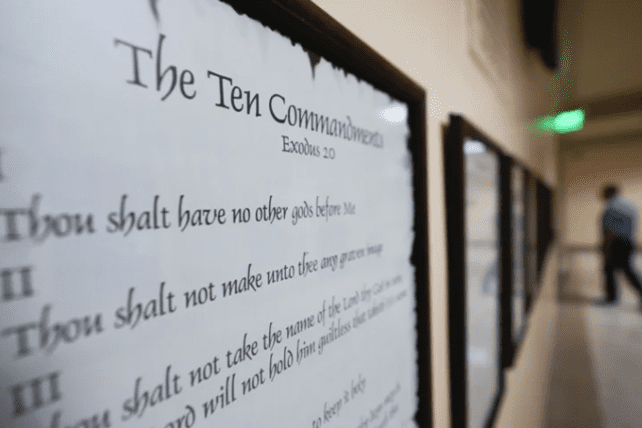(RNS) — When Louisiana Gov. Jeff Landry was asked to defend his support for a new state law requiring public schools to display a version of the Ten Commandments in public classrooms, he made sure to touch on the bill’s obvious religious connections.
“This country was founded on Judeo-Christian principles, and every time we steer away from that, we have problems in our nation,” Landry, a Catholic, said during an interview with Fox News.
But just a few days later, it was Christian clergy — along with an array of religious leaders and parents of various faiths — who filed a lawsuit against the new statute, backed by the Americans United for the Separation of Church and State, the Freedom From Religion Foundation and offices of the ACLU.
“As a minister, this law is a gross intrusion of civil authority into matters of faith,” the Rev. Jeff Sims, a Presbyterian Church (U.S.A.) minister and plaintiff in the case, said in a press conference about the lawsuit. “It interferes with the administration of God’s word, co-ops the word for the state’s own purposes, or claims God’s authority for the state.”
The back-and-forth is part of a broader fight raging across the country, with conservative state lawmakers — often backed by conservative Christians — pushing faith-focused laws and running into opposition from other religious people and their secular allies.
Over the past two years, at least 19 states have considered faith-forward legislation, including bills promoting the display or discussion of the Ten Commandments in schools and those allowing for school chaplains. Three states — Louisiana, Utah and Arizona — have already passed Ten Commandments legislation, although Arizona’s governor vetoed the bill, and Utah’s Legislature walked back their initial proposal, with lawmakers ultimately only adding the decalogue to a list of historic documents that can be discussed in class. In addition, Louisiana recently joined two other states — Texas and Florida — that have passed laws allowing for chaplains in public school.
At least one state has achieved similar aims by circumventing the legislative process altogether. Last month, Oklahoma Superintendent of Public Education Ryan Walters issued a directive requiring schools to “incorporate the Bible, which includes the Ten Commandments, as an instructional support,” and has said teachers who fail to teach students about the Scripture could risk losing their license.
“We’re proud to be the first state to put the Bible back in school classrooms,” Walters said in an interview with News Nation.
Religious leaders in the state were quick to push back against the directive, however, with one pastor from the more socially liberal United Church of Christ denomination posting, “Public schools are not Sunday schools,” according to KFOR. Rachel Laser, head of Americans United, told KFOR her group is mulling a legal challenge like the one they helped file in Louisiana, while Jewish leaders, Muslim leaders and a local Methodist bishop spoke out.
“United Methodists believe that the state should not attempt to control the church, nor should the church seek to dominate the state,” UMC Bishop James Nunn told KOCO in a statement. “We endorse public policies that do not create unconstitutional entanglements between church and state.”
While there are some differences, many of the bills share common traits or even language. Most of the bills advocating for displaying the Ten Commandments use a translation of the decalogue derived from the King James Version of the Bible, a translation that is not embraced by all Christians, much less Jewish Americans or those of other faiths. In fact, the text is slightly different from the KJV and has a particular history: It is the version compiled by the Fraternal Order of Eagles used to help promote the 1956 movie “The Ten Commandments.” The same version was also used on a Ten Commandments monument that sits outside the Texas State Capitol. (Despite a legal challenge, the U.S. Supreme Court ruled in 2005 that the monument is allowed to stand because of its “passive” nature.)
Bills pushing school chaplains also share common traits, likely a byproduct of the religious groups behind them. According to The New York Times, the National Association of Christian Lawmakers — a new group formed in 2020 — worked with lawmakers in Florida, Louisiana and Texas to pass chaplains bills. The Texas bill was also spurred by a group of activists affiliated with the National School Chaplain Association, a group run by former drug smuggling pirate Rocky Malloy.

